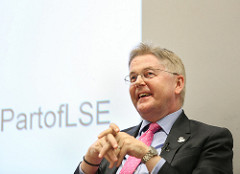 Dame Minouche Shafik pays tribute to the late Lord Heywood, an outstanding civil servant and a good friend to LSE.
Dame Minouche Shafik pays tribute to the late Lord Heywood, an outstanding civil servant and a good friend to LSE.
Jeremy Heywood, who passed away on 4 November 2018, was the outstanding civil servant of his generation and the indispensable advisor to four prime ministers. He was also a friend of 33 years since we met as students at LSE while doing an MSc in economics. We formed a study group with other friends and would meet regularly in the then smoke-filled Wrights Bar or occasionally in the Shaw library to exchange notes and solve problem sets together. Jeremy was clearly the most clever among us, but he was also mischievous and fun – it didn’t take much to extract him from the library where he was annotating obscure economics articles in his tiny, orderly handwriting to go out for a glass of Pinot Grigio (his favourite).
 Jeremy had been sent to LSE on a scholarship from the civil service. That bit of public investment paid off handsomely in a 35 year career culminating in becoming Cabinet Secretary in 2012. He was at the centre of every major policy challenge facing the UK — Black Wednesday, the G20 summit in Gleneagles with its focus on making poverty history, the 2008 financial crisis and most recently, Brexit. I was a Permanent Secretary during the 2010 election when the UK had the first coalition government in decades and Jeremy coordinated efforts across Whitehall to make sure that government departments had prepared for all eventualities so that the will of the people could be done.
Jeremy had been sent to LSE on a scholarship from the civil service. That bit of public investment paid off handsomely in a 35 year career culminating in becoming Cabinet Secretary in 2012. He was at the centre of every major policy challenge facing the UK — Black Wednesday, the G20 summit in Gleneagles with its focus on making poverty history, the 2008 financial crisis and most recently, Brexit. I was a Permanent Secretary during the 2010 election when the UK had the first coalition government in decades and Jeremy coordinated efforts across Whitehall to make sure that government departments had prepared for all eventualities so that the will of the people could be done.
No 10 was his domain. Prime Ministers came and went but Jeremy was always there asking penetrating questions that made policy better, working tirelessly, keeping the machinery of government ticking over, juggling crises, nurturing his beloved civil service. He hated the limelight which inevitably came with being the most senior public servant in the land. He always emphasized the “servant” over the “public” aspect of the role. It was never about him but always about us. He was the best of us but he used his considerable talents to make us the best of ourselves.
Jeremy was fiercely loyal to his friends. Some might say it was because he did not like change but I think it was because we kept him grounded while high politics swirled around him. He knew we loved him for who he was. He tried to answer all emails within an hour – whether you were the Prime Minister or his friend organizing an outing to the theatre. He was deeply egalitarian in his soul – from royalty to the most junior official – everyone was treated the same. His funeral was a roll call of “the great and the good” but what was most striking was the number of junior civil servants who told stories of Jeremy supporting them and how his soft-spoken probing encouraged them to make their ideas better.
In his professional life, Jeremy embodied the values of the civil service – honesty, integrity, impartiality and objectivity. He worked with hundreds of politicians, some of whom he liked and respected, others he may have not. But he served them all equally well. What made him special was his ability to give candid advice (and thereby stopping many bad ideas) and yet finding creative ways to achieve politicians’ objectives in the best way possible. There is something very selfless (and dare I say noble) in such an approach and it is why Jeremy defended the civil service when it came under attack to remind us it is an institution that is the envy of the world.
Jeremy understood the importance of investing in the next generation and, in addition to the many he mentored personally, he developed a programme for training talented UK civil servants which was competitively awarded to the LSE. Each year a cohort of (hopefully) 30 new Jeremys goes through the Executive Masters in Public Policy brimming with new ideas and a commitment to the public good.
His foibles were endearing. His academic brilliance was offset by complete incompetence in all things practical. Jeremy never could drive properly, or cook, or fix anything. He hated exercise and for months sported a flimsy bit of gauze wrapped around his wrist so he could avoid having to do press ups on Clapham Common. He had more Blackberry phones (simultaneously) and held onto them for longer than anyone.
And he adored his family. He and Suzanne supported each other unconditionally and that was never more apparent than over the last year. Those of us who watched Suzanne’s Herculean efforts all thought that if you are ever in trouble, you want her on your side.
Conversations during our dinners out were dominated by the children – their evolving political views and interests, musical accomplishments, and latest holidays. He was so proud of them and loved watching them grow up and discover the world. He also loved a good party, supported by his famous playlist, and was often the last one on the dance floor.
Jeremy was like the sun for so many of us – we all orbited around him. This was certainly the case for his friends, for his colleagues in Whitehall and for his family. That is why the world feels a bit colder and darker without him. His new title – Lord Heywood of Whitehall – and his burial in Westminster Abbey and the creation of a foundation in his name to support innovation in the civil service are fitting tributes to his enormous contribution to public life. He was a true servant of the people and a loyal and loving friend to those of us who had the privilege of knowing him.
____________
 Dame Minouche Shafik is the Director of the LSE.
Dame Minouche Shafik is the Director of the LSE.







